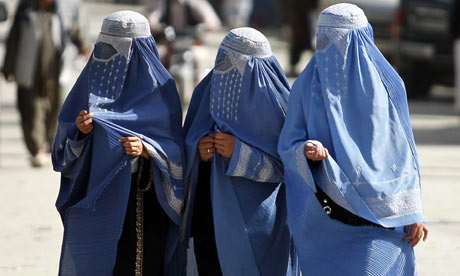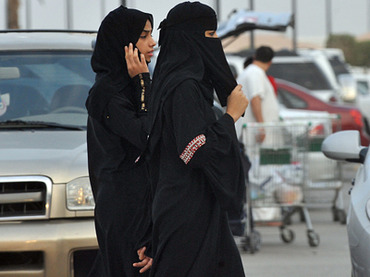About Sharia Law And Women
Source (google.com.pk)
"Islamic law" redirects here. For Islamic jurisprudence, see Fiqh.
Not to be confused with Saria (disambiguation), Shahriyar (disambiguation), Shara (disambiguation), or Shariyah (disambiguation).
To Arabic-speaking people, sharia (shariah, shari'a, sharīʿah; Arabic: شريعة šarīʿah, IPA: [ʃaˈriːʕa], "legislation"), means the moral code and religious law of a prophetic religion.[1][2][3] The term "sharia" has been largely identified with Islam in English usage.[4]
Sharia (Islamic law) deals with many topics addressed by secular law, including crime, politics, and economics, as well as personal matters such as sexual intercourse, hygiene, diet, prayer, everyday etiquette and fasting. Adherence to Islamic law has served as one of the distinguishing characteristics of the Muslim faith historically, and through the centuries Muslims have devoted much scholarly time and effort on its elaboration.[5] Human interpretations of sharia (fiqh) vary between Islamic sects and respective schools of jurisprudence, yet in its strictest and most historically coherent definition, sharia is considered the infallible law of God.[6]
Sharia Law is a significant source of legislation in various Muslim countries, namely Saudi Arabia, Sudan, Iran, Brunei, United Arab Emirates and Qatar. In those countries, flogging and stoning are legal punishments due to Sharia. There are two primary sources of sharia law: the precepts set forth in the Quranic verses (ayahs), and the example set by the Islamic prophet Muhammad in the Sunnah.[7] Where it has official status, sharia is interpreted by Islamic judges (qadis) with varying responsibilities for the religious leaders (imams). For questions not directly addressed in the primary sources, the application of sharia is extended through consensus of the religious scholars (ulama) thought to embody the consensus of the Muslim Community (ijma). Islamic jurisprudence will also sometimes incorporate analogies from the Quran and Sunnah through qiyas, though many scholars also prefer reasoning ('aql) to analogy.[6][7]
The introduction of Sharia is a longstanding goal for Islamist movements globally, including in Western countries, but attempts to impose sharia have been accompanied by controversy,[8] violence,[9] and even warfare.[10] Most countries do not recognize sharia; however, some countries in Asia, Africa and Europe recognize sharia and use it as the basis for divorce, inheritance and other personal affairs of their Islamic population.[11] In Britain, the Muslim Arbitration Tribunal makes use of sharia family law to settle disputes, and this limited adoption of sharia is controversial.[12]
The concept of crime, judicial process, justice and punishment embodied in sharia is different from that of secular law.[13] The differences between sharia and secular laws have led to an on-going controversy as to whether sharia is compatible with secular democracy, freedom of thought, and women's rights.[14][15][16]
In secular jurisprudence, sharia is classified as religious law, which is one of the three major categories that individual legal systems generally fall under, alongside civil law and common law.
Scholars describe the word sharia as an archaic Arabic word denoting "pathway to be followed",[18][19] or "path to the water hole".[22] The latter definition comes from the fact that the path to water is the whole way of life in an arid desert environment.[20]
The etymology of sharia as a "path" or "way" comes from the Quranic verse[Quran 45:18]: "Then we put thee on the (right) Way of religion so follow thou that (Way), and follow not the desires of those who know not."[19] Malik Ghulam Farid in his Dictionary of the Holy Quran, believes the "Way" in 45:18 (quoted above) derives from shara'a (as prf. 3rd. p.m. sing.), meaning "He ordained". Other forms also appear: shara'u[Quran 45:13] as (prf. 3rd. p.m. plu.), "they decreed (a law)"[Quran 42:21]; and shir'atun (n.) meaning "spiritual law"[Quran 5:48].[23]
The Arabic word sharīʿa has origins in the concept of ‘religious law’; the word is commonly used by Arabic-speaking peoples of the Middle East and designates a prophetic religion in its totality. Thus, sharīʿat Mūsā means religious law of Moses (Judaism), sharīʿat al-Masīḥ means religious law of Christianity, sharīʿat al-Madjūs means religious law of Zoroastrianism.[2] The Arabic expression شريعة الله (God’s Law) is a common translation for תורת אלוהים (‘God’s Law’ in Hebrew) and νόμος τοῦ θεοῦ (‘God’s Law’ in Greek in the New Testament [Rom. 7: 22]).[24] In contemporary Islamic literature, sharia refers to divine law of Islam as revealed by prophet Muhammad, as well as in his function as model and exemplar of the law.[2]
Sharia in the Islamic world is also known as Qānūn-e Islāmī (قانون اسلامی).[citation needed]
The origin of sharia is the Qu'ran, and traditions gathered from the life of the Islamic Prophet Muhammad (born ca. 570 CE in Mecca).[25]
Sharia underwent fundamental development, beginning with the reigns of caliphs Abu Bakr (632–34) and Umar (634–44) and imam Ali, during which time many questions were brought to the attention of Muhammad's closest comrades for consultation.[26] During the reign of Muawiya b. Abu Sufyan ibn Harb, ca. 662 CE, Islam undertook an urban transformation, raising questions not originally covered by Islamic law.[26] Since then, changes in Islamic society have played an ongoing role in developing sharia, which branches out into fiqh and Qanun respectively.
The formative period of fiqh stretches back to the time of the early Muslim communities. In this period, jurists were more concerned with pragmatic issues of authority and teaching than with theory.[27] Progress in theory happened with the coming of the early Muslim jurist Muhammad ibn Idris ash-Shafi'i (767–820), who laid down the basic principles of Islamic jurisprudence in his book Al-Risala. The book details the four roots of law (Quran, Sunnah, ijma, and qiyas) while specifying that the primary Islamic texts (the Quran and the hadith) be understood according to objective rules of interpretation derived from careful study of the Arabic language.[28]
A number of important legal concepts and institutions were developed by Islamic jurists during the classical period of Islam, known as the Islamic Golden Age, dated from the 7th to 13th centuries.[29][30][31][32]
Among some Muslims, tribal laws were adapted to conform to sharia "for they could not form part of the tribal law unless and until they were generally accepted as such."[33] Additionally, Noel James Coulson, Lecturer in Islamic law of the University of London, states that "to the tribe as a whole belonged the power to determine the standards by which its members should live. But here the tribe is conceived not merely as the group of its present representatives but as a historical entity embracing past, present, and future generations."[33] So, while "each and every law must be rooted in either the Quran or the Sunnah,"[34] without contradiction, tribal life brought about a sense of participation. Such participation was further reinforced by Muhammad who stated, "My community will never agree in error".[34]
The Umayyads initiated the office of appointing qadis, or Islamic judges. The jurisdiction of the qadi extended only to Muslims, while non-Muslim populations retained their own legal institutions.[35] The qadis were usually pious specialists in Islam. As these grew in number, they began to theorize and systemize Islamic jurisprudence.[36] The Abbasid made the institution of qadi independent from the government, but this separation wasn't always respected.[37]
Both the Umayyad caliph Umar II and the Abbasids had agreed that the caliph could not legislate contrary to the Quran or the sunnah. Imam Shafi'i declared: "a tradition from the Prophet must be accepted as soon as it become known...If there has been an action on the part of a caliph, and a tradition from the Prophet to the contrary becomes known later, that action must be discarded in favor of the tradition from the Prophet." Thus, under the Abbasids the main features of sharia were definitively established and sharia was recognized as the law of behavior for Muslims.[38]
In modern times, the Muslim community became divided into groups reacting differently to the change: secularists believe that the law of the state should be based on secular principles, not on Islamic legal doctrines; traditionalists believe that the law of the state should be based on the traditional legal schools;[39] reformers believe that new Islamic legal theories can produce modernized Islamic law[40] and lead to acceptable opinions in areas such as women's rights.[41] This division persists until the present day (Brown 1996, Hallaq 2001, Ramadan 2005, Aslan 2006, Safi 2003, Nenezich 2006).
There has been a growing religious revival in Islam, beginning in the eighteenth century and continuing today. This movement has expressed itself in various forms ranging from wars to efforts towards improving education
.Women
Main articles: Women in Islam and Islam and domestic violence
Domestic violence
Many scholars[15][162] claim Shari'a law encourages domestic violence against women, when a husband suspects nushuz (disobedience, disloyalty, rebellion, ill conduct) in his wife.[163] Other scholars claim wife beating, for nashizah, is not consistent with modern perspectives of the Quran.[164]
One of the verses of the Quran relating to permissibility of domestic violence is Surah 4:34.[165][166] In deference to Surah 4:34, many nations with Shari'a law have refused to consider or prosecute cases of domestic abuse.[167][168][169][170] Shari'a has been criticized for ignoring women's rights in domestic abuse cases.[171][172][173][174] Musawah/CEDAW, KAFA and other organizations have proposed ways to modify Shari'a-inspired laws to improve women's rights in Islamic nations, including women's rights in domestic abuse cases.[175][176][177][178]
Personal status laws and child marriage[edit]
Shari'a is the basis for personal status laws in most Islamic majority nations. These personal status laws determine rights of women in matters of marriage, divorce and child custody. A 2011 UNICEF report concludes that Shari'a law provisions are discriminatory against women from a human rights perspective. In legal proceedings under Shari'a law, a woman’s testimony is worth half of a man’s before a court.[179]
Except for Iran, Lebanon and Bahrain which allow child marriages, the civil code in Islamic majority countries do not allow child marriage of girls. However, with Shari'a personal status laws, Shari'a courts in all these nations have the power to override the civil code. The religious courts permit girls less than 18 years old to marry. As of 2011, child marriages are common in Middle East, accounting for 1 in 6 all marriages in Egypt and 1 in 3 marriages in Yemen. Rape is considered a crime in all countries, but Shari'a courts in Bahrain, Iraq, Jordan, Libya, Morocco, Syria and Tunisia in some cases allow a rapist to escape punishment by marrying his victim, while in other cases the victim who complains is often prosecuted with the Sharia crime of Zina (adultery).[179][180][181]
Women's role in the clergy
There are no priests or clergy needed in order to perform rites and sacraments in Islam. The leader of prayer is known as an imam. Men can lead both men and women in prayer, but women do not traditionally lead men in prayer, and usually lead other women in prayer.[182] In practice, it is much more common for men to be scholars than women, however in the early days of Islam, female scholars were much more common.[183] Islam does not prohibit women from working in a servile, secondary state to men, as it says, "Treat your women well and be kind to them for they are your partners and committed helpers."[full citation needed][184]
Women's right to property
Islam allows both single and married women to own property in their own right.[185] Islam grants women the right to inherit property from other family members, and these rights are detailed in the Quran. A woman's inheritance is unequal and less than a man's, and dependent on many factors.[Quran 4:12][186] For instance, a daughter's inheritance is usually half that of her brother's.[Quran 4:11][186]
Until the 20th century, Islamic law granted women certain legal rights that Western legal systems did not grant women.[187][188] Since the 20th century, Western legal systems have been thought to allow more women's rights than Islamic law, by allowing women to hold equal positions in society, with regards to employment, positions in government, and societal independence as in within familial settings.
Sharia Law And Women Abaya Designs 2014 Dress Collection Dubai Styles Fashion Pics Photos Images Wallpapers

Sharia Law And Women Abaya Designs 2014 Dress Collection Dubai Styles Fashion Pics Photos Images Wallpapers

Sharia Law And Women Abaya Designs 2014 Dress Collection Dubai Styles Fashion Pics Photos Images Wallpapers

Sharia Law And Women Abaya Designs 2014 Dress Collection Dubai Styles Fashion Pics Photos Images Wallpapers

Sharia Law And Women Abaya Designs 2014 Dress Collection Dubai Styles Fashion Pics Photos Images Wallpapers

Sharia Law And Women Abaya Designs 2014 Dress Collection Dubai Styles Fashion Pics Photos Images Wallpapers

Sharia Law And Women Abaya Designs 2014 Dress Collection Dubai Styles Fashion Pics Photos Images Wallpapers

Sharia Law And Women Abaya Designs 2014 Dress Collection Dubai Styles Fashion Pics Photos Images Wallpapers

Sharia Law And Women Abaya Designs 2014 Dress Collection Dubai Styles Fashion Pics Photos Images Wallpapers

Sharia Law And Women Abaya Designs 2014 Dress Collection Dubai Styles Fashion Pics Photos Images Wallpapers

Sharia Law And Women Abaya Designs 2014 Dress Collection Dubai Styles Fashion Pics Photos Images Wallpapers

Sharia Law And Women Abaya Designs 2014 Dress Collection Dubai Styles Fashion Pics Photos Images Wallpapers

Sharia Law And Women Abaya Designs 2014 Dress Collection Dubai Styles Fashion Pics Photos Images Wallpapers

Sharia Law And Women Abaya Designs 2014 Dress Collection Dubai Styles Fashion Pics Photos Images Wallpapers

Sharia Law And Women Abaya Designs 2014 Dress Collection Dubai Styles Fashion Pics Photos Images Wallpapers

Sharia Law And Women Abaya Designs 2014 Dress Collection Dubai Styles Fashion Pics Photos Images Wallpapers

Sharia Law And Women Abaya Designs 2014 Dress Collection Dubai Styles Fashion Pics Photos Images Wallpapers

Sharia Law And Women Abaya Designs 2014 Dress Collection Dubai Styles Fashion Pics Photos Images Wallpapers

Sharia Law And Women Abaya Designs 2014 Dress Collection Dubai Styles Fashion Pics Photos Images Wallpapers

Sharia Law And Women Abaya Designs 2014 Dress Collection Dubai Styles Fashion Pics Photos Images Wallpapers

Sharia Law And Women Abaya Designs 2014 Dress Collection Dubai Styles Fashion Pics Photos Images Wallpapers

Sharia Law And Women Abaya Designs 2014 Dress Collection Dubai Styles Fashion Pics Photos Images Wallpapers

We are specialized in translation and localization of websites by our professional web-designers cum translators, who have complete knowledge of developing and adjusting images,
ReplyDeleteCommunication Legal Translation provides the professional translation services in Dubai by qualified certified translators . If you are looking for legal translation services in UAE. We offer affordable and scalable translation in over 75 languages.Get in touch with us : https://communicationdubai.com/
ReplyDeleteThis comment has been removed by the author.
ReplyDelete